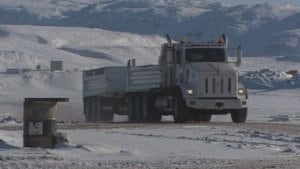“The message was very clear, there are resources there and we’re coming to get them, and you better be with us than against us”
As the climate changes, it’s become increasingly clear that those changes are having a significant affect on the Arctic and polar region.

A major international conference on Arctic issues- called “Arctic Circle” was held in Iceland this week.
Alain A. Grenier is a professor of nature-based tourism and sustainable development in the department of urban studies and tourism at the University of Quebec at Montreal.
Professor Grenier was enthusiastic going into the conference, but came away very concerned about the future of the far north in respect with some of the attitudes he encountered, primarily from business and investment interests.
ListenAs the ice melts, shipping through the Arctic waters is becoming far more attractive as is development and the lure of resources.
It is also becoming more accessible to tourism, and more interesting as a “last frontier” on earth. But increased tourism can have its own detrimental affects upon the environment if not planned for. It was for this reason that professor Alain A Grenier, an expert in northern tourism and sustainability attended a major international conference called the “Arctic Circle” in Iceland this past week. It brought together about 1000 influential people with interests in the Arctic, from politicians, to business , and from some 40 countries, most of which have no Arctic territory.

Hosted by Iceland’s president, this first Arctic Circle conference should not be confused with the Arctic Council. This latter group, which also discusses issues in the north, is comprised of government representatives of just the Arctic nations.
Professor Grenier says what he heard from leaders in the mining, shipping, oil and investment industries was very disconcerting. He say in his field of research into northern tourism and sustainability issues, they are very concerned about the fragility of the environment and the inclusion and consideration of affects upon the lifestyle of natives of the north. He said this was “not even mentioned from the extraction industries.
The prospect in the Arctic of the northern sea route in Russia, the Northwest Passage in Canada, and the Trans-Polar route opening without considering the fragility of the ecosystem and the culture of the native people living there, I found shocking and scary as well”
While there were televised speeches from well-known figures such as Hilary Clinton, and Al Gore, he said he was shocked at the attitudes of the business representative.
He also heard very little concern from them about the environment, about the residents of the far north, and even about sovereignty of the Arctic. In his notes he quotes such statements as “The Arctic doesn’t belong only to those Arctic Nations but to the world”
For him the message he heard in the various speeches was ““was very clear, there are resources there and we’re coming to get them, and you better be with us than against us”
He says he was surprised that no representative from the Canadian government spoke to counter any of the worrisome statements about development, extraction, and sovereignty. He says he came away from the conference very disillusioned about the future of the Arctic.
ARCTIC CIRCLE website http://www.arcticcircle.org/







For reasons beyond our control, and for an undetermined period of time, our comment section is now closed. However, our social networks remain open to your contributions.